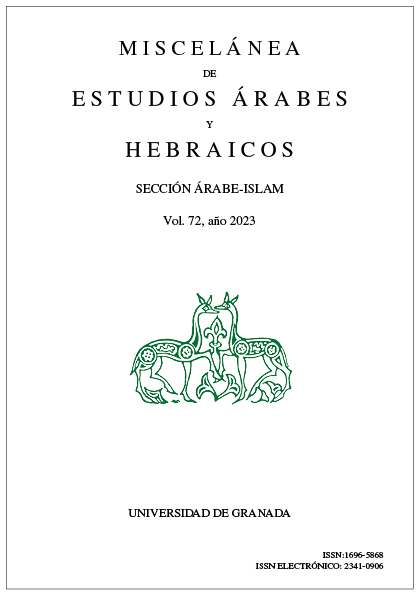Transitory Identities in El lunes nos querrán by Najat el Hachmi
DOI:
https://doi.org/10.30827/meaharabe.v72.24574Keywords:
Transitory identity. Migration. Najat el Hachmi. Hegemony. SubversionAbstract
The purpose of the present work is to study the representation of identity from the verstehen of migratory subjectivity in the work of Najat el Hachmi. Using an eclectic analytical methodology, we focus on the agency of certain narratological resources in the construction of a transitory and hybrid conception of the identity of the migrant subject in El lunes nos querrán [On Monday they will Love us]. We explore the literary re- codification of fundamental elements of the female migratory reality, in order to decon- struct the fetters of power that constrain the life and identity of two of the book’s protago- nists. But also to construct a world of non-belonging, in which the identity of the two women is built upon a continuous journey of subversion and questioning of the canonical representations of it. Our intention is to trace the literary itinerary that allows the two women to avoid the gaze of a multiple hegemonic system and break the circle of double marginality (gender and culture), to make the literary exploration of the body, love, sex and writing an instrument with which to construct a fleeting and transitory identity from a verstehenian mode of knowledge.
Downloads
References
ACHOTEGUI LOIZATE, Joseba. El síndrome de Ulises: contra la deshumanización de la migración. Ned Ediciones, 2020.
ANDERSON, Benedict. Comunidades imaginadas. Reflexiones sobre el origen y la difusión del nacionalismo. México: Fondo de Cultura Económica, 1993.
BARTHES, Roland. El grado cero de la escritura. Seguido de nuevos ensayos críticos. México: Siglo XXI, 2000.
BAUMAN, Zygmunt. Vidas desperdiciadas: la modernidad y sus parias. Buenos Aires: Paidós, 2005.
BAUMAN, Zygmunt. Modernidad líquida. México: Fondo de Cultura Económica, 2015.
BHABHA, Homi. “The Third Space. Interview with Homi Bhabha”. En Jonathan RUTHERFORD (ed.). Identity, Community, Culture, Difference. London: Lawrence & Wishart Limited, 1990, 207-221.
BHABHA, Homi. El lugar de la cultura. Buenos Aires: Ediciones Manantial, 2007.
BHABHA, Homi. “Introducción: narrar la nación”. En Homi BHABHA. Nación y narración. Entre la ilusión de una identidad y las diferencias culturales. Buenos Aires: Siglo XXI, 2010, pp. 11-21.
BUTLER, Judith. El género en disputa: el feminismo y la subversión de la identidad. Barcelona: Paidós, 2001.
DELEUZE, Gilles, y Guattari, Félix. Rizoma: introducción. Valencia: Pre-Textos, 2002.
ECO, Umberto. Obra abierta. Barcelona: Planeta Agostini, 1984.
EL HACHMI, Najat. El lunes nos querrán (edición electrónica). Barcelona: Destino, 2021.
FOUCAULT, Michel. La microfísica del poder. Madrid: La Piqueta, 1979.
FOUCAULT, Michel. Vigilar y castigar: nacimiento de la prisión. Buenos Aires: Siglo XXI, 2002.
FOUCAULT, Michel. Historia de la sexualidad. La volundad de saber. Madrid: Siglo XXI, 2007.
GRAMSCI, Antonio. Los intelectuales y la organización de la cultura. Buenos Aires: Nueva Visión, 1972.
MAALOUF, Amin. Identidades asesinas. Madrid: Alianza Editorial, 2012.
REAL ACADEMIA ESPAÑOLA. “Identidad”. En Diccionario de la Lengua Española, [versión 23.4, en línea]. https://dle.rae.es (13 de marzo de 2022).
SENNETT, Richard. Carne y piedra: el cuerpo y la ciudad en la civilización occidental. Madrid: Alianza Editorial, 1997.
SPIVAK, Gayatri Chakravorty. “¿Puede hablar el subalterno?”. Revista Colombiana de Antropología, 39, pp. 297-364. https://www.redalyc.org/articulo.oa?id=105018181010. (1 de marzo 2021).
SPIVAK, Gayatri. Crítica de la razón poscolonial: hacia una crítica del presente evanescente. Madrid: Ediciones Akal, 2010.
ORBACH, Susie. La tiranía del culto al cuerpo. Barcelona: Paidós, 2010.
WEBER, Max. “El sentido de la ‘neutralidad valorativa’ de las ciencias sociales y económicas”. En Max, WEBER (comp.). Ensayos sobre metodología sociológica. Buenos Aires: Amorrortu, 1970.
Downloads
Published
How to Cite
Issue
Section
License
The authors publishing their work in this journal agree to the following terms and conditions:
1. The authors retain the copyright and give the journal the right to be the first publication of the work and also to be licensee under a Creative Commons Attribution License which allows others to share the work, provided the author of the work and the initial publication in this journal are acknowledged.
2. Authors may make additional agreements separately for the non-exclusive distribution of the version of the work published in the journal (for example, putting it in an institutional repository or publishing it in a book), with acknowledgement of its initial publication in this journal.
3. Authors are allowed and encouraged to electronically disseminate (for example, in institutional repositories or on their own web page) the published version of their works (publisher's post-print version) or, if not possible, the author's reviewed and accepted post-print version. This is to facilitate productive exchanges, and allow for earlier and greater citation by third parties of the published works (See The Effect of Open Access).
4. The journal accepts no responsibility for the opinions expressed by the authors.



















